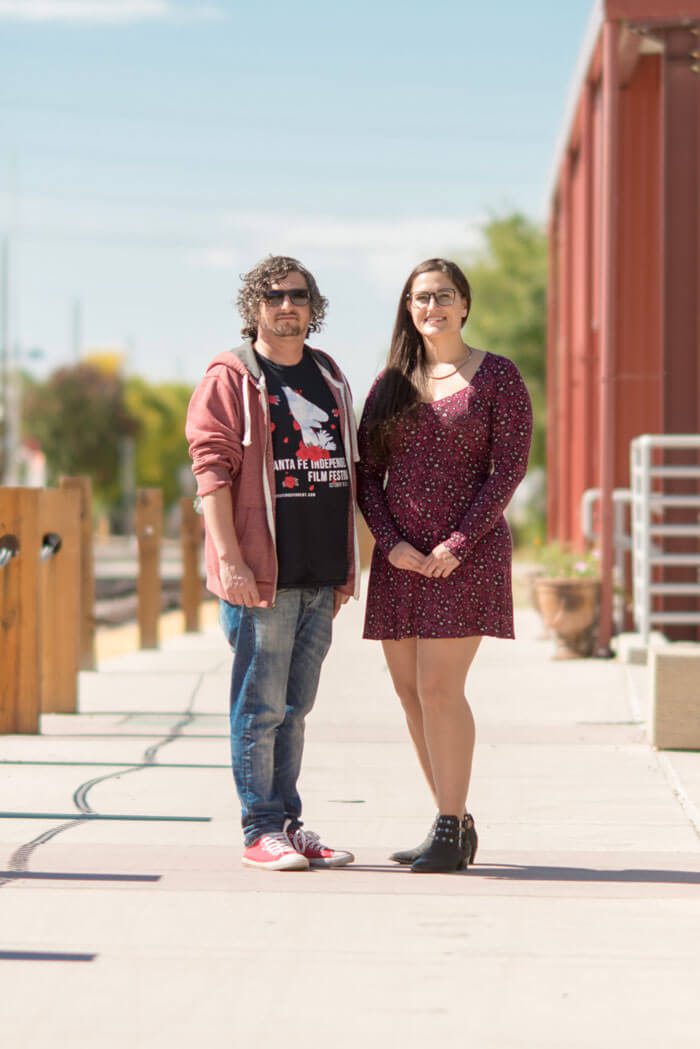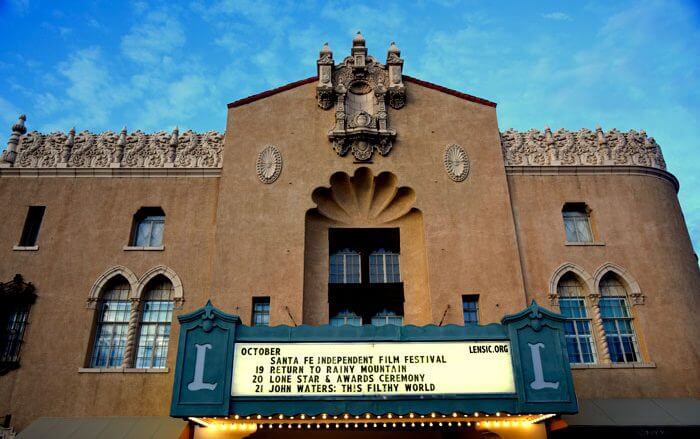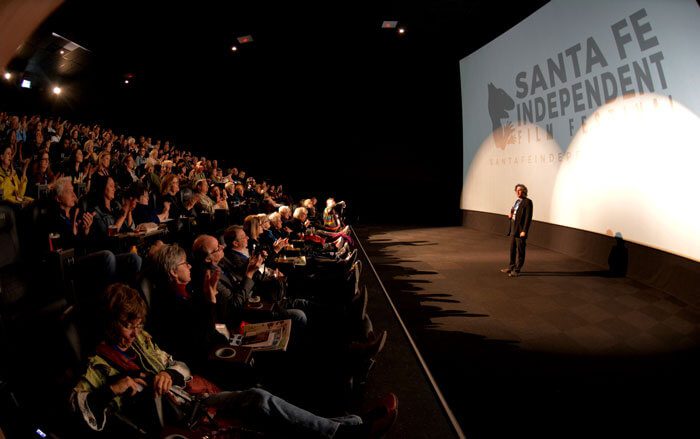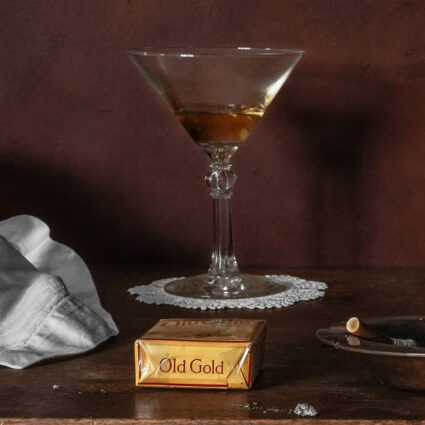
Much like the movies in its lineup, the inaugural Santa Fe Independent Film Festival had a dogged crew and a bare-bones budget. Jacques Paisner and two like-minded friends—David Moore and actor Gary Farmer—came up with the idea for the festival in 2009 and transformed the nonprofit teen arts center Warehouse 21 into a makeshift theater. They had about $2,500 and a score to settle with Santa Fe’s film community: that year, Paisner had unsuccessfully submitted a film—titled Rejection—to the Santa Fe Film Festival. He imagined the new festival as a scrappy Salon des Refusés for the avant-garde film community.
Jacques soon pulled his younger sister, Liesette Paisner Bailey, into the endeavor. She was a nineteen-year-old undergraduate student at the University of New Mexico but already had significant experience organizing big, complicated events. “I’d worked for a tour company; I’d done symposiums; I did the Women’s Writers Conference,” says Liesette. They offered her the volunteer title of Youth Director, and she got right to work. “It was like, ‘Do you guys have t-shirts?’ ‘No.’ ‘Do you guys have tickets?’ ‘No,’” she says.
That year, SFIFF screened about twenty-five films at Warehouse 21 and held talks with the filmmakers at a café along the train tracks. Liesette recalls hastily training volunteers to be projectionists and scrambling to rent a popcorn machine.
Ten years on, SFIFF is a citywide event that occupies most of Santa Fe’s movie theaters and attracts over ten thousand attendees each year. It’s the largest film festival in New Mexico and one of the state’s best attended cultural events overall. Jacques and Liesette, respectively SFIFF’s executive director and festival director, lead a staff of seven and answer to a star-studded advisory board that includes Smoke Signals director Chris Eyre and John Adams screenwriter Kirk Ellis.
Household names such as Robert Redford, Ethan Hawke, Ali MacGraw, and N. Scott Momaday have walked SFIFF’s red carpet and participated in its programming. True to its rebellious roots, the festival has also become an international showcase for artists on the cusp of major career breakthroughs.
About six weeks before this year’s festival, which runs October 17 to 21, the brother-sister team met after hours in their office above Jean Cocteau Cinema. Jacques and Liesette had just returned from the 45th Telluride Film Festival, and their two-room headquarters was strewn with the detritus of a recent volunteer meeting.
As they told the tale of SFIFF’s meteoric rise—tag-team-style, of course—the siblings quickly slipped back into the sneakers of shaggy-haired kids growing up in this city’s sleepier past. For all of its grown-up clout, SFIFF remains a love letter to two film-obsessed teenagers who witnessed the rise of the modern indie movie.
/

Jacques was born in Minneapolis in 1980 and remembers the family’s move to Santa Fe when he was seven years old. “I wanted to skateboard, and we were moving to a place where my mom told me there would be paved roads,” he says. “Turned out there weren’t as many paved roads in Santa Fe in 1987 as I was hoping for.” He recalls Santa Fe having “a similar vibe to Taos or Durango” back then. Liesette came along three years after the move in 1990, making the Paisners a family of six. Jacques and Liesette have two brothers, Sage and Raoul, both of whom live in Santa Fe.
“We grew up with a family where our grandma’s motto was, ‘You can never watch enough TV,’” says Liesette. “Movies were really important.” The family frequented Video Library and since-shuttered video stores like Captain Video and Casablanca. The Paisner patriarch, Barry, would rent stacks of Marx Brothers and Charlie Chaplin movies. (Jacques still frequents Video Library, though he’s not great at returning his rentals on time. “Lisa [Harris] calls up the office and she’s like, ‘Where is The Cabinet of Doctor Caligari?’” he howls.)
“We both grew up at really iconic times for the movies,” Jacques says. “For me it was movies like Star Wars and Raiders of the Lost Ark and E.T., and for her in the ’90s, it was this whole other wave of classic films.” Jacques remembers taking Liesette and her friends to Ten Things I Hate About You and Clueless. “He also showed me all the best independent movies,” Liesette says. “Like In the Name of the Father and, of course, all the Spike Lee films.”
Together, Jacques and Liesette watched their way through the early years of a new genre. “It was that real wave of ’90s independent films,” Liesette says. “Jawbreaker, Swingers—that kind of film that was more about relationships than that big, grand plot.”
Despite their early, eclectic passion for the movies, neither sibling had childhood dreams of entering the industry. Jacques studied philosophy at the University of New Mexico, and Liesette got an undergraduate degree in history there.
It wasn’t until 2009, after Jacques wrote, directed, and produced Rejection, that the idea to found a film festival took shape. Liesette was enrolled at UNM but had moved back to Santa Fe for the summer. Both siblings are effusive about their love for their home city, but they saw a jagged hole in Santa Fe’s culture that they were eager to fill.
“There was a film festival here, but it wasn’t really reaching out to out-of-towners; it wasn’t reaching out to filmmakers; it wasn’t really celebrating the artists,” says Liesette. “When we had the opportunity to do the fest, it was really awesome, because I could create the kinds of events that were never offered to me when I was a teenager or young adult.”
/
Gonzo, Liesette’s dog, is clearly in the running for the title of SFIFF’s mascot. (Another contender is the towering Iron Giant sculpture in the hallway, but Gonzo is up in the polls for cuteness.) The dog is enormous and mostly sits politely between Jacques and Liesette’s desks—unless he’s crashing around the office in a sniffing frenzy.
“I was just about to turn nineteen when I got him,” Liesette says. “I guess it was the same year as the first fest, because I was nineteen and Jacques was twenty-nine.” As Gonzo swiftly grew into a hulking creature, so did SFIFF. Two years after the first festival, SFIFF had expanded from three days to five and from twenty-five films to more than one hundred. In 2012, Liesette graduated from UNM and applied for the position of festival director.
“She wanted to do it, and there were a couple of other candidates at the time, but they weren’t even close,” says Jacques. Liesette already knew the festival inside and out, though it had significantly scaled up that year. “That was when we first moved into this office above the Lensic,” Jacques says. “We must have had, like, two hundred volunteers that year, so we had this whole staff, and there was even a receptionist. Liesette finished school in May, and she came in as festival director and was like, ‘Who are all these people?’”\
‘Being a young woman, people want to challenge you more or tell you what to do or how to act…Interns from that year still write me and thank me for showing them that a young woman can run stuff.’
That year, Liesette was the same age as some of her interns. Jacques remembers one of the interns arriving early in the morning to print out her book manuscript on SFIFF’s printer. “We let people get away with anything, almost,” he says. The highlight of the festival’s 2012 schedule was the New Mexico premiere of Bless Me, Ultima, which is based on the novel by Rudolfo Anaya and was filmed in Santa Fe. Jacques and Liesette had planned to screen it at Warehouse 21, but demand was so high that they had to move it to The Lensic. Anaya appeared at the sold-out event and accepted the festival’s American Author Award.
“It was just so crazy, and I guess three months after that The Lensic would still get calls, ‘I want to see Bless Me, Ultima,’” Liesette says. The 2012 festival was Liesette’s trial by fire as director, and it was not easy. “Coming in somewhere when you’re twenty-two to run a whole event and tell everyone what to do, it was hard. Being a young woman, people want to challenge you more or tell you what to do or how to act,” she says. “Interns from that year still write me and thank me for showing them that a young woman can run stuff.”
In 2013, Game of Thrones author and longtime Santa Fean George R.R. Martin reopened the Jean Cocteau Cinema, where Jacques and Liesette now manage marketing and programming. The festival hit ten thousand attendees in 2014, and 2015 marked the opening of Violet Crown Cinema. Santa Fe’s cinema industry had serendipitously expanded to match SFIFF’s growing ambitions. There was no need to rent a popcorn machine anymore.
At the same time, high-profile figures from the industry began accepting the festival’s awards. John Waters took the American Director Award in 2013 (and appeared at the festival again last year), Martin and Shirley MacLaine accepted lifetime achievement awards in 2014, and Gena Rowlands appeared for a tribute to her career and a lifetime achievement award in 2015. Jacques and Liesette point out framed Pasatiempo covers on the wall that commemorate many of these moments.
“We had to pick someone who was going to be able to do this,” Jacques says of choosing Liesette as director. “Ten years later, we’re one of the biggest cultural events in the city and state, and the only critically acclaimed film event within hundreds of miles. So, yeah, it was the right choice.” Liesette bursts into laughter. “Wow, that was so nice, Jacques!”
/

Award ceremonies, red carpet events, and talks are key elements to any film festival worth its salt, but the true proof is in the screenings. “You have to get creative [with events], because a bunch of people sitting in a building in the dark, it doesn’t pour out into the streets,” says Jacques. “But where it really happens is in front of your eyes and in your mind. The emotional experience that you leave with happens in the theater.”
Jacques and Liesette focus each year’s slate on films that haven’t hit wide release yet—and sometimes never do, at least in Santa Fe. This year, they went to Telluride and the Sundance Film Festival in search of up-and-coming films. Jacques has traveled to Cannes and Tribeca, and they’ve both done the Berlinale and AFI festivals in years past. Many of their selections originate from a submission process that attracts hundreds of applicants each year.
“It’s fun, because our audience likes to be challenged,” says Liesette. “You can play some pretty provocative films.” Jacques mentions that their box office has received death threats for certain screenings, but Liesette clarifies that it’s because the films had sold out. “We show provocative films, but Santa Fe people protest other things,” Jacques says with a laugh.
The siblings seem to have a knack for hitting cultural watersheds: last year’s festival opened with The Square, which had recently won the Palme d’Or at Cannes; actress Yolanda Ross appeared at the festival the year before she scored an Independent Spirit Award; Rowlands accepted her SFIFF award just six weeks before receiving an honorary Oscar.
This year’s festival remains ahead of the curve. Cartoonist Bill Plympton, who’s known for his work on classic animated shows on MTV, will appear for a masters class and a screening of his new short, Modern Times. Part of the festival will unfold in virtual reality, with a “digital dome” packed with Oculus headsets on the campus of the Institute of American Indian Arts.
Jacques and Liesette see a lot of potential for further growth. Unlike Telluride or Sundance, which tend to dominate their small home cities, Santa Fe has many cultural offerings outside of SFIFF. “We’re kind of letting people enter into our Santa Fe,” says Liesette. “They get to see movies in this area that we think is so special, that we’re so lucky to grow up in. It’s just such a different experience than you have anywhere else.”
What do the siblings do together outside of work? Jacques and Liesette look at each other. “We go to the movies,” says Jacques.



